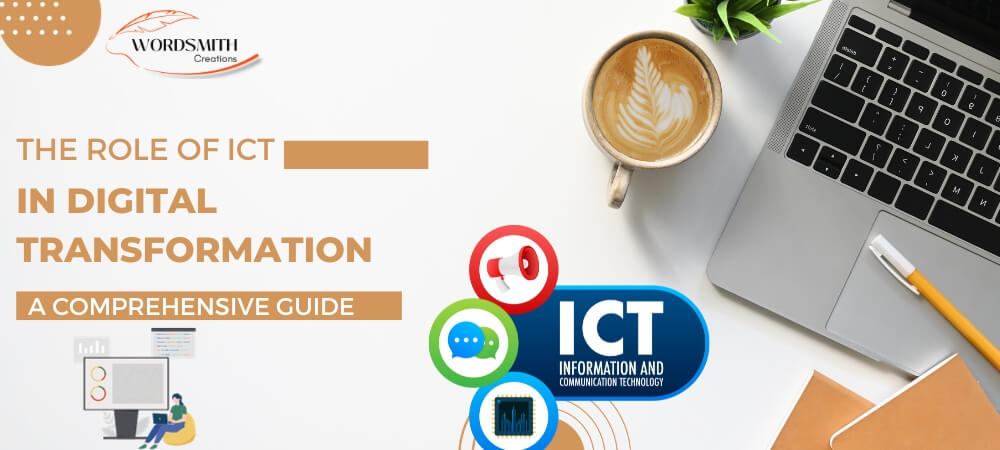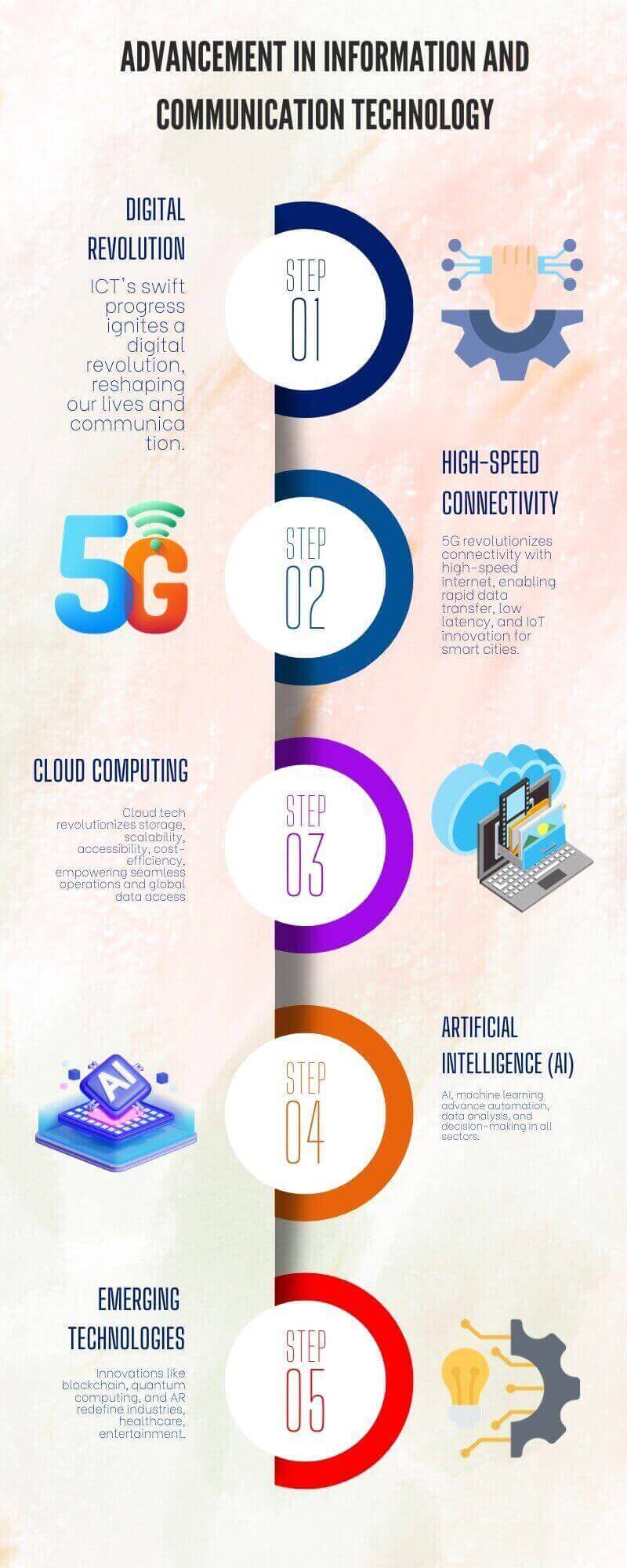
Introduction
Information and communication technology (ICT) has revolutionised the way we live, work, and interact with one another in the modern world. In a time of accelerating technological development, information and communication technology (ICT) refers to a wide range of devices, programs, and systems that make it possible to transfer, store, and manipulate data in real time. With the rise of smartphones and the interwoven web of international communication networks, ICT has changed not only how we access and exchange knowledge but has also sparked revolutionary shifts in business, healthcare, education, and other fields. Along with erasing physical distances, this revolutionary force has also created new opportunities and encouraged unprecedented levels of connectivity and innovation. Understanding ICT's enormous effects is crucial for navigating the complexities of our always-changing technological environment in this age of digital interconnection.
History and the growth of Information and communication technology
Information and communication technology (ICT) has a long, complex, and fascinating history. ICT describes the devices and programs used to collect, store, process, and transmit data and the driving force behind the development of information and communication technology is the hardware and software development company. Here is a brief summary of the significant turning points in ICT history.
- Ancient Communication Tools- Information and communication technologies have a long history that dates back to pre-19th century ancient civilizations. Semaphore systems, drums, and smoke signals were just a few of the ways that people communicated over large distances.
- Telegraph- Samuel Morse's development of the telegraph at the beginning of the 19th century revolutionized long-distance communication. Using electrical signals and Morse code, messages may be delivered quickly via wires.
- Telephone- The telephone, invented by Alexander Graham Bell, made it possible to communicate by voice across great distances. This innovation had a significant impact on how people communicated.
- Radio- The first functional wireless telegraphy system, created by Guglielmo Marconi, is credited with enabling widespread radio transmission and communication.
- Television- The development of television technology in the early 20th century made it possible to transmit sound and moving images. Rapidly, this media took over as the primary means of communication and entertainment.
- Computers- A key turning point in the history of ICT was the development of electronic computers in the middle of the 20th century. Massive early computers like the ENIAC were mostly employed in the military and science.
- Transistors and Microchips- Computers are now smaller, faster, and more widely available thanks to the development of transistors and microchips. This opened the door for the creation of personal computers and the expansion of the tech sector.
- ARPANET- The forerunner of the current internet was the Advanced Research Projects Agency Network (ARPANET). The American Department of Defense created it to make it easier for scientists and researchers to communicate.
- Internet- The ARPANET and other pioneering networks gave rise to the Internet as we know it today. Tim Berners-Lee created the World Wide Web in 1989, opening up the Internet to the whole world.
- Mobile Phones- Compact, feature-rich smartphones have replaced the big, pricey mobile phones. They are now necessary tools for accessing information, communicating, and more.
- Digital Revolution- How data is stored, processed, and transported has undergone a revolution as a result of the digitization of information and the growth of the internet. E-commerce, social media, and the production of digital material all increased as a result.
- Cloud Computing- The way that organizations and people access and store data and software has changed thanks to cloud computing services like Amazon Web Services (AWS) and Microsoft Azure.
- Big Data and AI- ICT systems massive data production has accelerated the development of big data analytics and artificial intelligence, which have profound effects on a wide range of businesses.
- IoT(Internet of Things)- Everyday items may now gather and exchange data thanks to the IoT, which has connected them to the Internet. This technology can be used in smart cities, housing, healthcare, and other areas.
- 5G and Beyond- Faster and more dependable wireless communication is promised with the rollout of 5G networks, opening the door for developments like autonomous vehicles and augmented reality.

Advancement in Information and Communication Technology
Till now, we only talked about the growth of information and communication technology in the past but if we talk about the advancements that nowadays we are enjoying are many. Advancement simply means the latest upgrade in the technology which makes all these things much easier for us to use. So, Information and communication technology advancements have been modifying and reshaping our environment at a rapid pace. Virtually every area of our lives has been transformed by the development of information and communication technology (ICT) during the past few decades. By enabling immersive experiences like augmented and virtual reality and powering the Internet of Things (IoT), which is now able to connect an ever-growing number of devices and sensors to the Internet, 5G networks have ushered in an era of super-fast wireless communication that will make cities and homes smarter.
With the ability to comprehend and process natural language, spot patterns in data, and even make predictions and decisions, artificial intelligence (AI) and machine learning (ML) technologies have advanced to new levels, revolutionizing a variety of industries, from healthcare and finance to manufacturing and entertainment. Even though it is still in its infancy, quantum computing has the potential to solve issues that were once thought to be intractable. This has profound implications for problems in cryptography, materials research, and optimization. While edge computing is evolving to bring processing power closer to the source of data, boosting real-time capabilities, cloud computing has developed into a cornerstone of modern IT architecture, enabling scalable and affordable options for organizations and consumers alike. Together, these developments thrust our civilization into a period of extraordinary connectedness, intellect, and inventiveness, and they portend a future in which technology will continue to provide us with abilities we have yet to completely appreciate.
Advancing Information and Communication Technology to Enhance Our World
Information and communication technology (ICT) is essential to making the world a better place because it fosters economic growth, expands access to healthcare and education, improves environmental sustainability, and fosters social inclusion. The following are some of the main ways that ICT makes the world a better place:
- Economic Development- By fostering innovation, improving company procedures, and spawning new markets and employment possibilities, ICT has the potential to propel economic growth. It encourages entrepreneurship and links companies to international markets, which is especially advantageous for emerging economies.
- Education- ICT has completely changed education by making it possible to access a wealth of information and learning materials online. It makes education more inclusive and accessible to people all over the world, regardless of their location or socioeconomic background, by enabling remote learning, online courses, and digital libraries.
- Healthcare- ICT-based telemedicine and e-health solutions have the potential to increase access to healthcare in underserved areas. Better health outcomes are achieved thanks to the rapid diagnosis and treatment of diseases made possible by remote consultations, digital health records, and data analytics.
- Environment Sustainability- ICT can help create a world that is more environmentally friendly by maximising resource utilisation. Energy conservation, water resource management, and waste minimization are made possible by smart grids, IoT sensors, and data analytics. Additionally, travelling less due to remote work and virtual meetings means less carbon emissions.
- Social Inclusion- ICT gives underprivileged communities access to opportunities, resources, and information. By allowing persons with disabilities to access digital content and engage in the workforce, it improves social inclusion. Additionally, social media and online platforms help underrepresented groups have their voices heard and promote international cooperation for social concerns.
- Disaster Management- Disaster preparedness and response are aided by ICT. People in disaster-prone locations can receive critical information via early warning systems, mobile apps, and social media platforms, helping to save lives and reduce damage.
- Government Services- Digital platforms and e-government services improve bureaucratic procedures, lower corruption, and increase transparency. Government services and accountability are increased when citizens may more easily access them, pay their taxes, and engage in politics.
Conclusion
Information and communication technology (ICT) has had a remarkable impact on the way our world has changed for the better. It has fundamentally changed how we interact with one another, live, work, and practically every other facet of our everyday existence. ICT has proven its enormous potential to improve the world, from its role in promoting economic growth and enhancing access to healthcare and education to its contributions to social inclusion, environmental sustainability, and international cooperation. ICT is still on a positive track as we look to the future. Even more breakthroughs and opportunities are promised by cutting-edge technologies like 5G, AI, quantum computing, and the Internet of Things. These developments will continue to transform industries, open up new avenues, and tackle some of the most important issues affecting humanity, such as healthcare access and climate change.